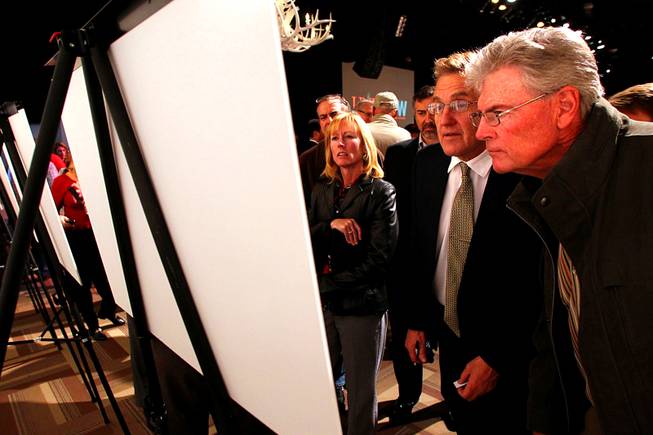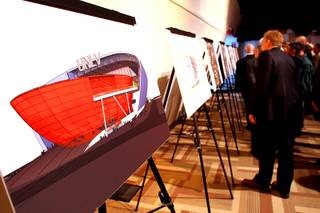
Gary Plumlee, right, and Ed Uehling look at conceptual renderings during a preview of a proposed on-campus, multi-use stadium for UNLV Tuesday, February 1, 2011.
Published Tuesday, Feb. 1, 2011 | 9:30 a.m.
Updated Tuesday, Feb. 1, 2011 | 2:30 p.m.
KSNV: Proposed stadium
KSNV coverage of proposed domed stadium for Las Vegas, Feb. 1, 2011.
Proposed UNLV stadium
- Should the proposed arena be built near the UNLV campus?
- Yes — 90.0%
- No — 10.0%
This poll is closed, see Full Results »
Note: This is not a scientific poll. The results reflect only the opinions of those who chose to participate.
Sun Archives
- Regents to hear UNLV arena plan for football, basketball (1-31-11)
- Mayor: UNLV domed stadium wouldn’t conflict with a downtown Las Vegas arena (1-27-2011)
- Report: UNLV domed stadium plans will be unveiled Tuesday (1-27-2011)
- Goodman: Arena project a key issue for next Las Vegas mayor (1-20-2011)
- UNLV acknowledges effort to bring stadium, football to campus (1-19-2011)
- Mayor: Sports arena ballot petition 'irrelevant' to city arena efforts (11-18-2010)
- Symphony Park targeted for sports arena (11-12-2010)
- Mayor: American League team says no to Las Vegas (8-26-2010)
- Mayor: Without public funding for arena, Las Vegas won't get NBA team (7-22-2010)
- Strip sports arena has very little support (6-10-2010)
- MGM Mirage opposes arena options seeking public financing (5-18-2010)
- County wants arena details, says public money unlikely (4-6-2010)
- Cowboys Stadium poses Texas-sized threat to Vegas (3-21-2010)
Beyond the Sun
Proposed location
Developers laid out plans today for a 150-acre master-planned development near the UNLV campus that would include retail space and residential housing, with a 40,000-seat domed stadium as its centerpiece.
The plans by billionaire real estate businessman Ed Roski and Silverton Casino Lodge president Craig Cavileer would bring UNLV football games to campus, replacing Sam Boyd Stadium. It would also provide a new home for the UNLV basketball team and stave off efforts by other cities to move the National Finals Rodeo out of Las Vegas.
The stadium and retail district would be built on property adjacent to the Thomas & Mack Center used as a parking lot at Tropicana Avenue and Paradise Road. The Thomas & Mack would be remodeled, although the center would still be able to host athletic events if conflicts arose at the new venue.
Cavileer said the stadium would have 40,000 seats to accommodate UNLV football games, with seating of about 20,000 for UNLV basketball games and other events such as concerts, soccer, boxing and bullriding. It would have the option of seating as few as 7,500 people.
Plans call for 600,000 square feet of retail and commercial space. Developer Majestic Realty will look to enter into a yearlong memorandum of understanding with the university during a special Feb. 11 meeting with the Nevada System of Higher Education regents. That would give Majestic exclusive rights to partner with UNLV and allow negotiations to move forward.
Cavileer stressed that no timetable exists for the proposed project, which is still in early phases of planning.
UNLV President Neal Smatresk on Tuesday called the development "a game-changer for our university."
"We have very few opportunities, particularly during these very stressful fiscal times, to really make a difference in our campus community," he said. "When a campus has a more residential feel, when there's a buzzing, vibrant campus atmosphere ... we will enhance (students') success. We will be able to recruit them. We will be able to attract them. We will be able to graduate them in higher numbers."
Cavileer said he didn't know the cost of the proposed project, saying it's "far too early" for a price tag.
Majestic Realty plans to ask the Nevada Legislature to create a University Enterprise District, Cavileer said. The company would retain tax revenue generated within the district, which would provide a future income stream that would allow Majestic to secure early financing, he said.
No taxpayer money would be used from outside the district, Cavileer said. The naming rights alone could bring in tens of millions of dollars, based on similar projects around the country, alongside expected revenue from donations, rent, advertising, suite sales and parking.
He also stressed that plans on display Tuesday were conceptual in nature, and many details of the design -- led by Dan Meis, who worked on the Staples Center in Los Angeles and Paul Brown Stadium in Cincinnati -- are still unclear.
The proposed development includes about 3,000 units of university housing and new gateways to the UNLV campus: one near the intersection of Harmon Avenue and Paradise Road, the other on Tropicana Avenue.
"We see this as a re-imagining of the UNLV brand and what that stands for," Cavileer said. It would provide student housing -- less than 10 percent of the university's students live on campus -- and a centralized location for students to shop and dine.
"This would be the fabric of the campus," he said.
To accommodate the increase in traffic that would come to the area, Cavileer said final plans would account for at least 15,000 additional parking spaces.
Cavileer also plans to meet with Randall Walker, director of the Clark County Department of Aviation, to get assurances that the project would be compatible with McCarran International Airport. The flight path of McCarran’s north-south runways is over the UNLV campus and the Federal Aviation Administration may need to review plans before the county can approve new construction.
FAA clearance has been necessary before some Strip projects like the Stratosphere Tower and Fontainebleau could be built.
Also of concern would be airport traffic egress with the removal of Swenson Street if some of the preliminary plans are developed. But Cavileer said his team “has about 23 different alternatives” that could be considered if Swenson access is removed.
Cavileer, a member of the UNLV foundation, said planning commenced in 2010 when athletic director Jim Livengood and football coach Bobby Hauck took their jobs at the university. Smatresk, who became UNLV's president in August 2009, said the school saw Majestic's plans as "an incredible opportunity" to bring the football team to campus and improve the overall student experience.
Questions were raised Tuesday about a professional basketball or hockey team coming to Las Vegas. Although Cavileer said the stadium would primarily serve UNLV, it would be ready to handle an NBA or NHL franchise as well, he said.
Roski, who ranked 524th on Forbes magazine’s list of the world’s billionaires in 2008 and has a track record for building arenas and investing in sports businesses, has been trying to build a football stadium in downtown Los Angeles and bring a National Football League team back to L.A.
His company partnered to build Los Angeles’ Staples Center, home of the Los Angeles Lakers and Los Angeles Clippers National Basketball Association teams and the Los Angeles Kings National Hockey League team. Roski is part owner of the Kings and Lakers.
Roski owns the Silverton in Las Vegas. Cavileer is the casino’s president.
Sun reporter Rick Velotta contributed to this report.


Join the Discussion:
Check this out for a full explanation of our conversion to the LiveFyre commenting system and instructions on how to sign up for an account.
Full comments policy